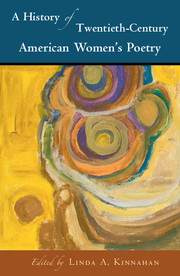Book contents
- Frontmatter
- Contents
- List of figures
- List of contributors
- Preface
- Acknowledgments
- PART I MAPPINGS AND CHRONOLOGIES
- PART II ETHNICITY, RACE, AND IDENTITY
- 5 Native American Women Poets
- 6 Asian American Women Poets
- 7 Chicana/Latina Women Poets
- 8 African American Women Poets
- 9 Jewish American Women Poets
- PART III MATERIAL FORMATIONS
- PART IV LINEAGES, TIES, AND CONNECTIONS
- PART V FORM, LANGUAGE, AND TEXT
- PART VI CODA
- Bibliography
- Index
6 - Asian American Women Poets
from PART II - ETHNICITY, RACE, AND IDENTITY
Published online by Cambridge University Press: 05 June 2016
- Frontmatter
- Contents
- List of figures
- List of contributors
- Preface
- Acknowledgments
- PART I MAPPINGS AND CHRONOLOGIES
- PART II ETHNICITY, RACE, AND IDENTITY
- 5 Native American Women Poets
- 6 Asian American Women Poets
- 7 Chicana/Latina Women Poets
- 8 African American Women Poets
- 9 Jewish American Women Poets
- PART III MATERIAL FORMATIONS
- PART IV LINEAGES, TIES, AND CONNECTIONS
- PART V FORM, LANGUAGE, AND TEXT
- PART VI CODA
- Bibliography
- Index
Summary
A number of incisive book-length studies of Asian American poetry have been published in recent years, but poetry by Asian American women remains one of the least-studied areas of American literature. Within the fields of Asian American literature and feminist studies, novels, short stories, and memoirs by Asian American women and men continue to garner the most critical attention. In poetry studies, the experimental poetics of Myung Mi Kim and Mei-Mei Berssenbrugge have received some notice, but their writing is not often placed within the context of earlier work by Asian American women poets. A historical review of Asian American women poets must consider the significance of absences shaped by genre, race, and gender, and negotiate the tensions generated by a distinction that is conventionally drawn between aesthetic and sociopolitical modes of value.
In The Children of 1965, Min Hyoung Song observes a recurrent trope in Asian American literary history, the figure of the lost manuscript. Song relays several examples of this history of loss: the sequel to Maxine Hong Kingston's novel Tripmaster Monkey, burned in the 1991 Oakland fire; John Okada's distraught widow destroying his papers in 1971 after she was unable to find interested publishers or archiving venues; Sui Sin Far's 1912 statement that she had written a second book – which we now know was never published. The trope of the lost manuscript, Song proposes, “invoke[s] all the narratives by Asian Americans that were not or could not be written or published, the many stories one is sure were there to be told but were not.” The racial formation Asian American, Song continues, “necessarily references a history of absent storytelling.” Song's discussion of these unrecoverable texts and untold stories counsels us to attend to the gaps and fissures that Asian American literary history comprises. As I will discuss, the incomplete nature of this literary historical record derives from the vicissitudes of Asian American gendered racial formation.
Asia and Asian peoples have constituted an integral part of the American popular imagination for centuries. Historians like Gary Okihiro remind us, for example, that Columbus was searching for Asia when he came across the Americas.
- Type
- Chapter
- Information
- A History of Twentieth-Century American Women's Poetry , pp. 90 - 105Publisher: Cambridge University PressPrint publication year: 2016

